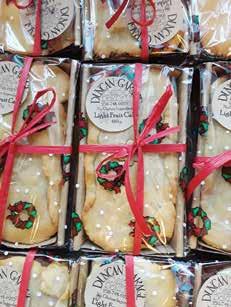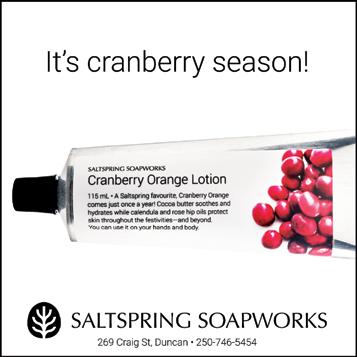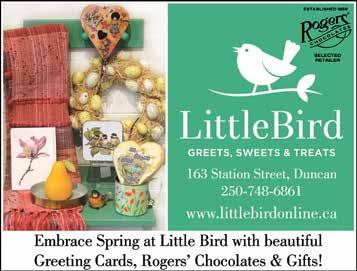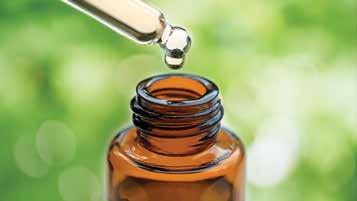
5 minute read
The Traditions of Fruitcake

It would probably take an entire book to tell the long and complicated history of fruitcakes. For thousands of years, through many countries and many religions, the most special and expensive ingredients have been saved to be prepared for important feast days. Dried fruits, since fresh wasn’t possible, have usually featured in midwinter celebrations.
Advertisement
At the Duncan Garage, we start our fruitcake process in late August or early September by soaking fresh local and dried organic fruits in rum and wine, to sweeten and preserve the fresh fruit and plump up the dried. We never use ‘candied’ or artificially coloured fruit of any kind.
We have to bake our Dark Fruitcakes by early November, so they can have a little sleep, soothed occasionally by a light brushing of brandy, before they’re ready for sale in December. This means we have already baked all we can for the year, so pick up what you want as soon as you can. They easily last a year or more tightly wrapped in the fridge (we like to save some slices for the heavy spring gardening dig-fest, when tea and fruitcake make the perfect afternoon pick-me-up.)
Dark fruitcakes are more fruit and nuts than cake; there’s just enough unleavened spicy butter and molasses batter around the morsels. We make them with a no-gluten-ingredient blend of flours or with wheat flour.
Light fruitcakes don’t need to age; they’re ready to eat as soon as they’re cooled from the oven. As soon as we’ve made the Dark cakes, we soak up a new batch of fruit with a focus on fruits such as pineapple and blonde figs that are naturally light in colour even when dried. The Light fruitcake batter is much lighter in both colour and texture; it incorporates whipped egg whites and is literally zested up with fresh orange and lemon rind and subtly enriched with ground almonds. We make both wheat and no-gluten-ingredient options for light fruitcakes too, and we cover them with a lovely layer of marzipan to seal the goodness in. Store them tightly wrapped in the fridge.
We also do a vegan fruitcake; it started as a wartime rationing recipe when eggs and butter weren’t available, but it’s a really nice spiced cake. We make them and sell them from our retail freezer because they are more likely to go stale than the more traditional types of fruit cakes.

Submitted by Jenny Bradshaw
Come see our wonderful selection of Christmas gifts of Christmas gifts ORGANIC & NGI PIES, CAKES, BREADS, ROLLS & FRUIT CAKES
Open MonDAY-SatURDAY to nourish you during shopping with warm, delicious & organic home made food.

Duncan Garage Cafe and Bakery 330 Duncan Street, Downtown Duncan 250 748-6223
SHOP WITH US


Tuesday - Friday 11am - 4pm Saturday 10am - 3pm

Imagine That! Artisans’ Designs
251 Craig St., Downtown Duncan imaginethatartisans.com I 250-748-6776



Shop Little Bird for quality, local & imported art cards & wrap, decor, Rogers’ Chocolates, lovely & useful gifts! Open Tues - Sat 10 - 4 Contact by phone or Facebook

LUCID LUNGS
Good health to you! Tina Foster, RHN Essential Remedies
The air we breathe, how we breathe, and how we nourish our bodies- all play a part in the health of our essential LUNGS. Getting outside regularly and breathing fresh air (especially outside of the city) is important, as is exercise to oxygenate the lungs and body tissues and strengthen lungs. Now that it’s colder out and our homes are shut, consider using an air purifier indoors to eliminate molds, bacterias, dust/allergens, etc. Regularly using an essential oil diffuser if you’re able to, will help clean the air in your home, and thus the air you breathe in. Ensure you avoid smoke and pollutants, chemicals in your home and personal care products to reduce much toxic exposure, as we absorb these via skin and airways. We want to avoid toxic buildup in our tissues and must be proactive about it.
Eating a natural whole foods antiinflammatory diet, while avoiding your personal sensitivities is key to prevent inflammation in the body including the lungs, as mucous-forming foods and allergens can irritate airways. Apart from allergens, respiratory infections are caused by bacteria and viruses that enter through the airways and then cause uncomfortable cold/flu symptoms like mucous, coughing, sinus congestion, and achiness.
Here are some wonderous remedies to help prevent and tackle inflammation and sickness of the airways and lungs, and these you can use during the cold/ flu season....
• Licorice Root - a tonic for whole body, excellent for throat, mucous membranes, and lung function • Mullein - herb as tea or tincture for pulmonary and respiratory function. Coating action on mucous membranes. • Marshmallow root - as tea, tincture, or capsules, very effective emollient herb with a high mucilaginous content that soothes entire tract and treats coughs. • NAC- N-acetyl-cysteine, a popular precursor to glutathione (the body’s top antioxidant). It helps reduce inflammation in the lungs related to asthma, COPD, coughing, and inflammation elsewhere in the body too. • Ginseng - a powerful adaptogen Traditional Chinese Medicine root that strengthens the whole body and mind, and excellent for cold/flu prevention and treating lung disorders like COPD and asthma. A good choice for anyone with a weak bronchiole-lung system. Fights infections in airways. • Black Seed oil - an Ayurvedic seed oil with many benefits, particularly to support lungs, sinus, and respiration. Antibacterial, antiviral, and great anti-inflammatory. • Elecampane is used for lung diseases including asthma, bronchitis, and whooping cough. It is also used to prevent coughing, especially










